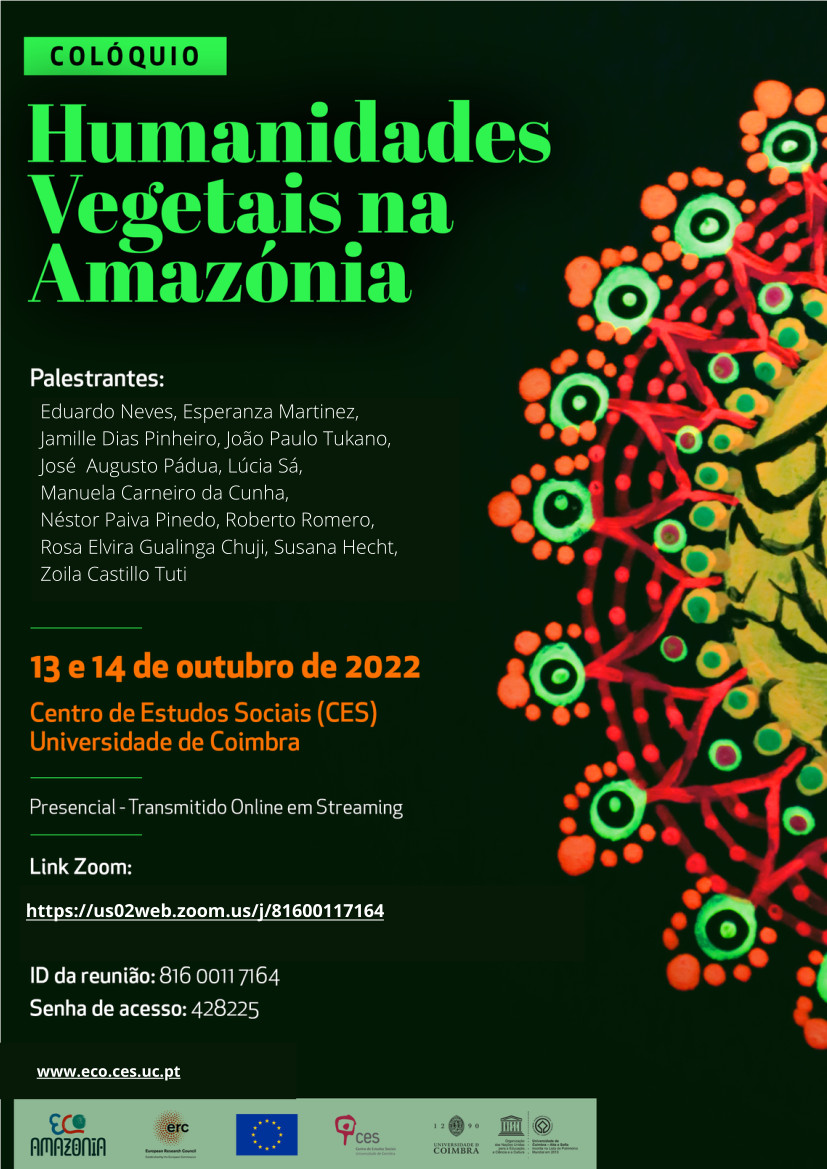Colóquio
Humanidades Vegetais na Amazónia
13 e 14 de outubro de 2022
Sala 1, CES-Coimbra + Online
Apresentação
Nas últimas décadas, diferentes campos disciplinares têm passado por uma profunda reorganização motivada, por um lado, pelo agravamento da crise climática e ambiental, e, por outro, pelas reivindicações dos movimentos anticoloniais e antirracistas em todo mundo. No contexto latino-americano, em particular, o crescente protagonismo dos povos indígenas, quilombolas e demais comunidades tradicionais na arena política, bem como na esfera académica, configuram um fator decisivo em vista de novas abordagens da questão socioambiental. Diante deste cenário, as chamadas “Humanidades Ambientais,” ao congregarem estudos da literatura, cinema, filosofia, história, antropologia, arqueologia e ecologia, entre outros, demonstram a relevância de diferentes abordagens acerca da complexa relação entre humanos e não-humanos. No centro destes debates, as plantas emergiram, paulatinamente, como seres não só biológicos, mas também históricos, sociais e políticos, com o potencial de subverter noções arraigadas sobre agência, inteligência, modos de estar no mundo e, no limite, as próprias fronteiras que delimitam a noção de humanidade. Ao mesmo tempo, do ponto de vista disciplinar, os estudos sobre as plantas questionam fronteiras disciplinares e o processo histórico de especialização científica, predicado na oposição entre as ciências naturais e as ciências humanas e sociais.
Deriva deste quadro a proposta de discutir o conceito de “Humanidades Vegetais” a partir de uma perspectiva interdisciplinar e no contexto mais alargado do crescimento exponencial das Humanidades Ambientais na última década. A Amazónia, uma região conhecida pela sua sociobiodiversidade e na qual as plantas têm um papel fulcral na cosmovisão dos povos indígenas, quilombolas e ribeirinhos, constitui o ponto de partida para uma reflexão multiespecífica sobre as plantas. Procuraremos neste colóquio estabelecer um diálogo com a ontologia relacional dos povos amazónicos, para os quais muitas plantas são seres que, tal como os humanos, têm os seus pontos de vista específicos. Como se configuram as interações entre plantas, seres humanos e outras entidades na bacia amazónica? Quais as contribuições do pensamento amazónico para as Humanidades Ambientais? Que imagens (alternativas) de humanidade revelam as plantas? Estas são algumas das perguntas que servirão de mote ao colóquio.
Evento no âmbito do projeto ECO: Animais e plantas em produções culturais sobre a bacia do rio Amazonas (2022-2026) (ERC - GA 101002359)
Foto do destaque: Leto Saraiva Rocha/Embrapa
______________
Esta atividade será transmitida através da plataforma Zoom, sem inscrição obrigatória. No entanto, está limitada ao número de vagas disponíveis > https://us02web.zoom.us/j/81600117164 | ID: 816 0011 7164 | Senha: 428225
Agradecemos que todas/os as/os participantes mantenham o microfone silenciado até ao momento do debate. A/O anfitriã/ão da sessão reserva-se o direito de expulsão da/o participante que não respeite as normas da sala.
As atividades abertas dinamizadas em formato digital, como esta, não conferem declaração de participação uma vez que tal documento apenas será facultado em eventos que prevejam registo prévio e acesso controlado.


